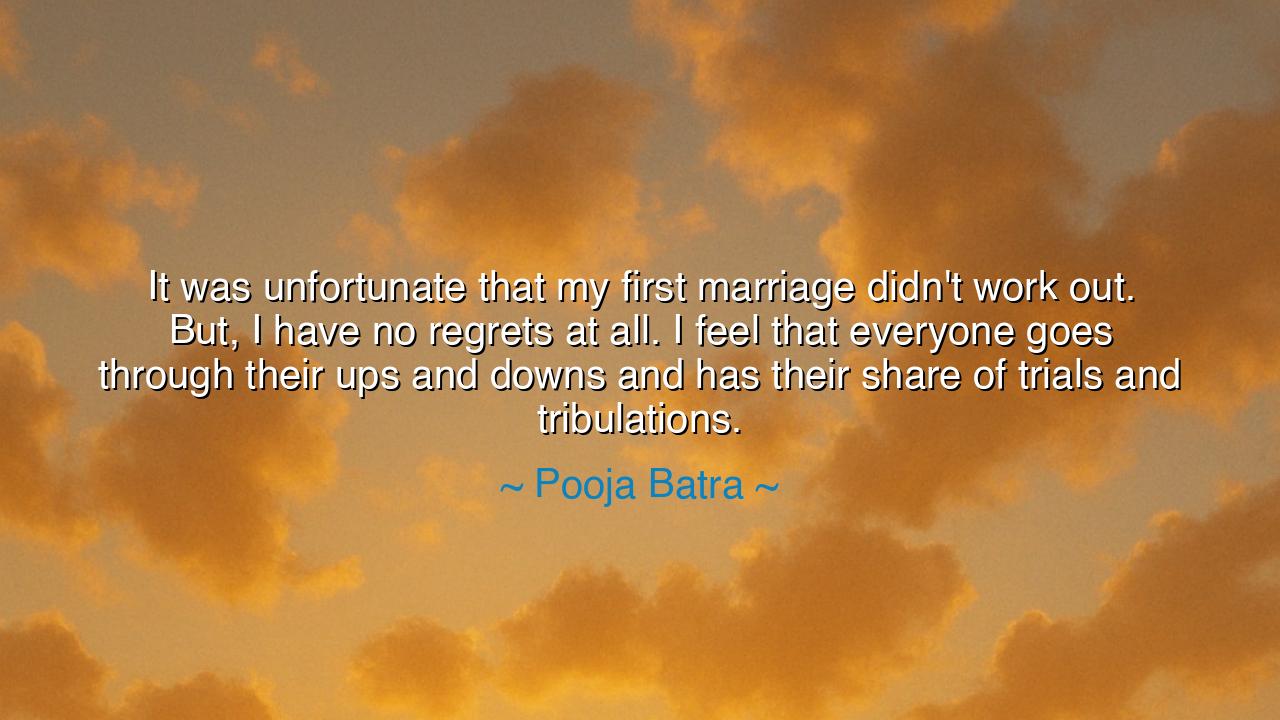
It was unfortunate that my first marriage didn't work out. But, I
It was unfortunate that my first marriage didn't work out. But, I have no regrets at all. I feel that everyone goes through their ups and downs and has their share of trials and tribulations.






In the words of Pooja Batra, “It was unfortunate that my first marriage didn’t work out. But, I have no regrets at all. I feel that everyone goes through their ups and downs and has their share of trials and tribulations.” These words ring with the sound of resilience, the voice of one who has faced disappointment yet chooses not to be broken by it. Rather than dwelling in bitterness, she embraces wisdom, seeing her life not as failure but as a journey through which growth and strength are forged. Her confession is not one of sorrow, but of courage—the courage to walk through ruin and emerge with dignity.
The ancients too spoke of such endurance. They knew that the human heart, like the body, is tested through fire and storm. In the plays of Sophocles, heroes suffer not because of their weakness, but because suffering itself is woven into the fabric of mortal life. Yet the noblest among them are those who refuse to sink into despair. Pooja Batra’s words echo this timeless truth: that brokenness in marriage, or in any human endeavor, is not the end, but a passage through which deeper strength and wisdom can be found.
Her phrase, “I have no regrets at all,” is both radical and liberating. For many are trapped by the past, shackled to mistakes or failures, replaying them endlessly in their minds. Regret becomes a prison, keeping them from living in the present or hoping for the future. But to cast off regret is to claim freedom. It does not mean ignoring pain, but transforming it into lesson. Just as a warrior learns from defeat more than from victory, so too does the human spirit grow more through loss than through success. In this, her words are a lesson to all who carry the burden of regret: release it, for life is too precious to waste in backward glances.
History provides us with examples of this wisdom. Consider the story of Abraham Lincoln, whose early life was marked by repeated failures—failed business, failed elections, even deep personal sorrow. Yet he famously said that his failures taught him endurance, and in the end, he became one of history’s greatest leaders. His life reminds us that trials and tribulations, though heavy in the moment, prepare us for future greatness. Just as Batra speaks of her first marriage without bitterness, Lincoln carried his failures as stepping stones toward his destiny.
The deeper meaning of her words is not simply about marriage, but about the human condition itself. Life is never a smooth path. Each of us, regardless of wealth, beauty, or power, must face hardship. The ancients taught that this is what gives life its depth: without sorrow, joy is shallow; without trial, triumph is hollow. To embrace one’s ups and downs is to accept life in its fullness, not as something to be controlled, but as a river to be navigated with grace.
The lesson for us is clear: do not fear the collapse of what you hoped would endure. Whether in marriage, in friendship, in work, or in dreams, the breaking of something once cherished does not diminish your worth. What matters is not that storms come, but that you endure them with courage. Do not live with regret, for regret steals the lessons of hardship. Instead, see each loss as a teacher, guiding you toward greater wisdom, humility, and resilience.
Practical actions follow from this wisdom. Reflect on your past without bitterness, seeking the lessons hidden within your trials. Release regret, for it serves no purpose except to chain you to what cannot be undone. Embrace tribulations as teachers, knowing that hardship refines the spirit as fire refines gold. And above all, move forward with dignity, carrying not the weight of failure but the light of wisdom into the next chapter of life.
Thus, Pooja Batra’s words stand as both confession and teaching. She admits the sorrow of a marriage that failed, yet she chooses not to be defined by it. Instead, she claims the strength of one who has endured, and in so doing, she lights the path for others. Let us pass on this wisdom: that life’s ups and downs, trials and tribulations, are not curses but blessings in disguise, shaping us into souls capable of compassion, courage, and greatness.






AAdministratorAdministrator
Welcome, honored guests. Please leave a comment, we will respond soon